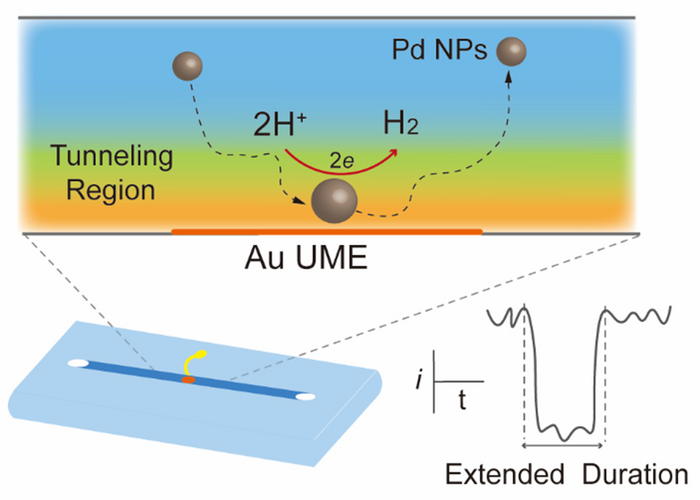
The short collision duration of single nanoparticles hinders the further improvement in their electrocatalytic performance. Here, to increase the collision duration of single nanoparticles in the electron tunneling region, enhanced near-wall hindered diffusion is introduced in the stochastic collision process by coupling an Au ultramicroelectrode with a confined microchannel. The hydrodynamic trapping confined in the microchannel effectively permits the activation of the hydrogen evolution reaction on the single palladium nanoparticles. Image Credit: Chinese Journal of Catalysis
However, there is an urgent need to improve the electrocatalytic performance of single NPs. At its most basic, the electrochemical reaction can be activated only when single NPs reach the tunneling distance. As a result, extending the collision duration of single NPs in the tunneling zone should help to improve electrocatalytic efficacy.
A research group headed by Prof. Yi-Tao Long of Nanjing University in China recently reported the usage of a limited microchannel to regulate the dynamic motion of single Pd NPs, with the goal of developing a platform to extend the collision period of single Pd NPs in the tunneling zone.
Single Pd NP collisions act as a model system for investigating high-performance catalysts for the hydrogen evolution reaction (HER). Because of the enhanced hydrodynamic trapping effect, the integrated charge linked with the HER in the constricted channel becomes twice as high as that based on typical single-NP collisions. The findings were reported in the Chinese Journal of Catalysis.
Following the completion of stochastic collision electrochemical tests, the microchannel is initially cast in PDMS and connected to a glass slide holding an Au UME. It should be noted that the collision time of Pd NPs using the restricted microchannel is longer than that of the traditional UME.
When NPs are distributed in a constricted microchannel, near-wall inhibited diffusion is considerable, implying that single NP diffusion is hampered by extra hydrodynamic adsorption. As a result, the near-wall inhibited diffusion effect, which could limit dynamic single Pd NPs in the tunneling region where the HER may arise. In addition, the reaction time during a collision is increased.
To further demonstrate the influence of an extended collision duration on the HER dynamics, single Pd NP collisions with the microchannel-based Au UME were conducted at varying applied overpotentials.
The time-resolved current signals are produced by charge displacement at the double layer of the Au UME due to the dynamic motion of single Pd NPs, hydrogen under-potential desorption, and HER on single Pd NPs, as per information on the electrochemical characteristics of Pd NPs for HER in the ensemble system.
Journal Reference
Lu, S.-M., et al. (2022) Enhanced single-nanoparticle collisions for the hydrogen evolution reaction in a confined microchannel. Chinese Journal of Catalysis. https://www.sciencedirect.com/science/article/pii/S1872206721640342?via%3Dihub